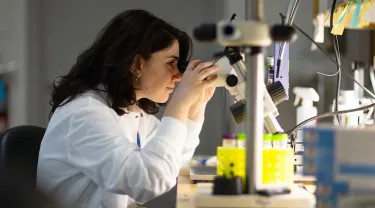Adults typically need seven to eight hours of sleep each night—but many fail to get that much. For older adults and those with neurodegenerative diseases in particular, nighttime sleep can be elusive. Such individuals often experience increased wakefulness at night and increased sleepiness during the day.
To find out why, Tufts postdoctoral scholar Martina Chiacchiaretta delved into the intricate brain mechanisms that govern the sleep-wake cycle.
Building upon previous research from the lab of neuroscientist and Grisard Professor Phil Haydon at Tufts University School of Medicine, Chiacchiaretta found that astrocytes, which make up nearly half of all cells in the brain, release lactate to control a type of neuron that governs wakefulness.
Disrupting the transportation of lactate from astrocytes to neurons leads to a decrease in the excitability of the neurons. To cause the disruption, Chiacchiaretta experimented with two methods: blocking monocarboxylate transporters (MCTs), the main vehicles for moving lactate through the brain, and selectively reducing the expression of a type of MCT specifically associated with astrocytes.
The results? Both methods led to decreased wakefulness and increased sleepiness.
The postdoctoral scholar’s findings have the potential to shed new light on the mechanisms underlying sleep disturbances, laying the groundwork for further studies aimed at modulating MCTs and the concentration of lactate in the brain.
In addition to Chiacchiaretta and co-corresponding author Phil Haydon, the other authors include: co-first author Alice Braga, researcher at University College London; Dong Kong, professor at Boston Children's Hospital and Harvard Medical School; and Luc Pellerin, professor at University of Poitiers in France.
“It’s important to better understand the mechanisms that control the sleep-wake cycle in order to slow down the sleep problems that happen with aging and neurodegenerative diseases, such as Alzheimer’s disease,” said Chiacchiaretta.
